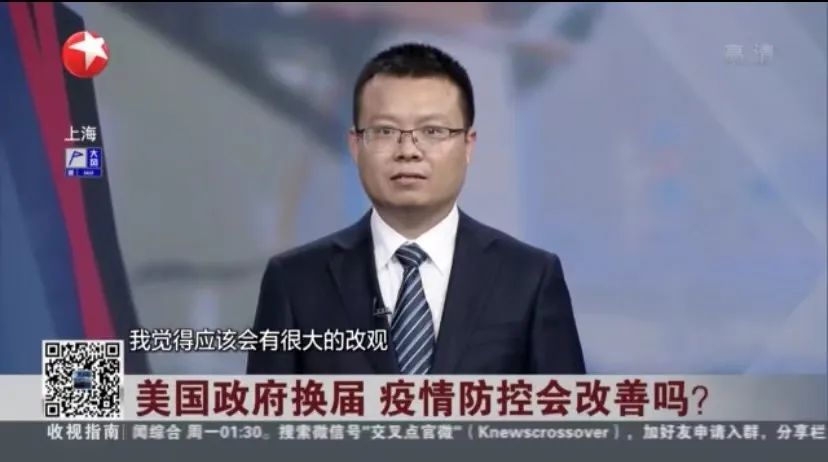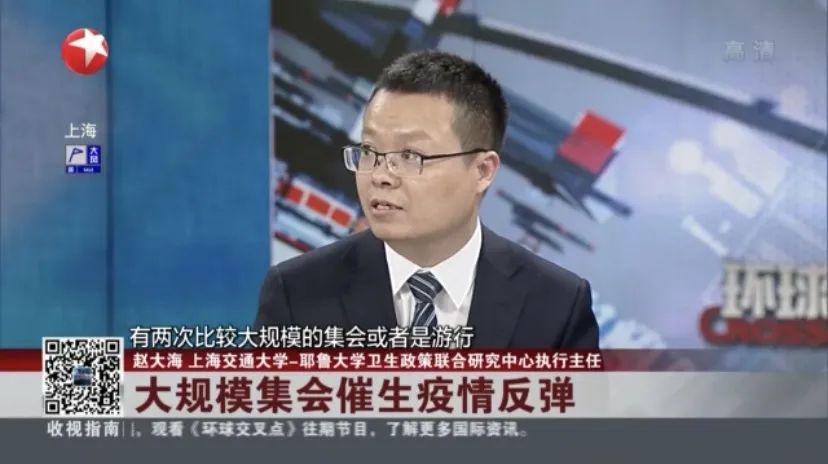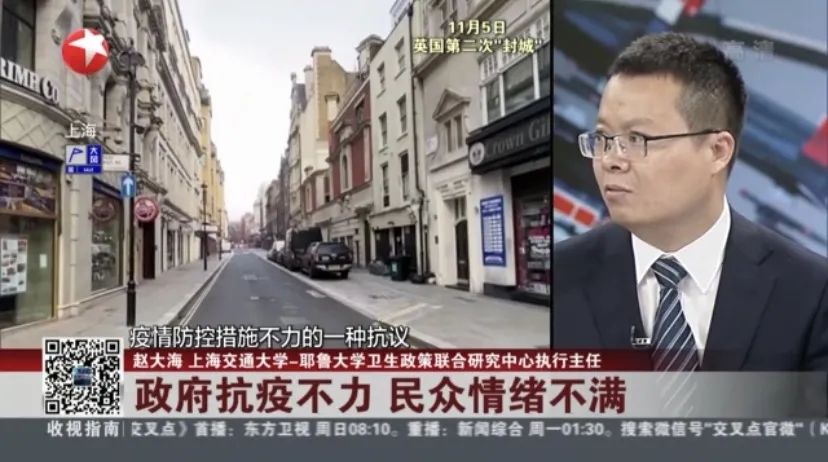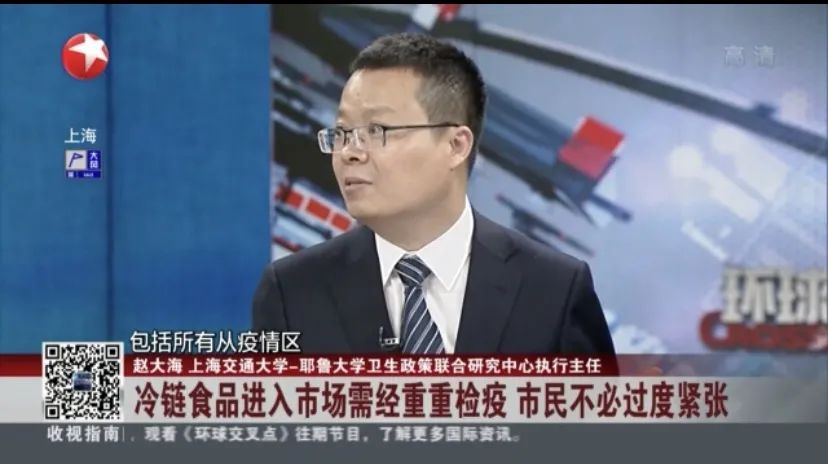上海交大赵大海做客东方卫视演播室:全球新冠疫情至暗时刻已露希望曙光
上海交通大学国际与公共事务学院博士生导师、上海交通大学-耶鲁大学卫生政策联合研究中心执行主任赵大海,自新冠肺炎疫情暴发以来,对于新冠疫情暴发、防控以及卫生政策第25次接受上海电视台专访,也是第64次接受央视、上视专访。2020年11月22日,赵大海做客东方卫视演播厅,在《环球交叉点》节目,就美国、欧洲、日本的新冠疫情近况以及疫苗研发和最新疫情防控重点等话题进行了访谈。演播室同期嘉宾还包括上海国际问题研究院研究员赵干城、上海公共卫生临床中心医学部主任沈银忠。现只将关于赵大海的访谈内容摘录如下。
主持人:如果政权顺利交接,美国的疫情防控会有很大改善吗?
赵大海:我觉得应该会。
主持人:美国防疫目前最大的掣肘是什么?
赵大海:我觉得最大的掣肘是特朗普政府对新冠疫情不够重视。
主持人:除了美国,世界上还有哪个国家的疫情您最关注?
赵大海:蒙古国。
主持人:美国最近的疫情数字出现了明显的加速态势,您觉得这跟哪些情况有关?
赵大海:美国从新冠疫情暴发以来,有两次比较大规模的集会或者游行,第一次就是反种族歧视的游行,反种族歧视游行结束之后,很快美国的新冠确诊病例数有一个非常大的攀升;第二次就是总统大选的集会活动,又有一个非常大的攀升。
主持人:美国得州艾尔帕索县六个移动太平间,甚至还需要额外的用拖车来运送尸体,那我们可不可以认为说美国的医疗资源已经到了一个崩溃的边缘?
赵大海:这种情况相对而言还是比较少的,应该讲是比较极端的个例。另外,美国整个的医疗系统,到目前为止,还没有被新冠所打穿。最大的原因就是美国没有做到所有的病人都要住院;大部分确诊病人,依然没有被要求到医院,或者被强制住院,现在收治的病人还不到一百万,还不至于让美国的医疗系统崩溃。
主持人:拜登成立“新冠疫情过渡咨询委员会”,当选后要马上应对新冠疫情。您认为美国疫情会有好转吗?
赵大海:首先拜登上台,已经到了一月底;在那个时候,新冠疫苗应该已经可以批量生产,对于拜登而言,只需要等待到1月20号,整个美国的新冠疫情就会有所好转;另外一方面,在美国很难找出一个比特朗普更不关注美国疫情防控的联邦政府主要官员。因此,无论从哪一个角度讲,我相信拜登在1月20号上台之后,美国的疫情一定会出现好转。但是好转,不可能是一蹴而就的,它需要一个过程。
主持人:欧洲各国的疫情似乎有再度恶化的趋势,我们也看到,比如说德国、法国、意大利、英国,再度的采取封锁的措施,对于公众的抗议,您怎么看?
赵大海:整个欧洲大部分的公众还是比较配合政府的封国或者是封城的政策,之所以会有一些民众反对和抗议,很大的原因是对于政府疫情防控措施不力的一种抗议,他倒不是说完全是为了反对封城的抗议,而是说第一轮政府没有防控住,我们公众可以谅解;但是第二轮依然有这么大的暴发,而且比第一轮在很多国家都要严重很多。因此,公众是对政府疫情防控不力的不满。
主持人:我们的近邻日本这几天疫情数字也有抬升的趋势,特别是在北海道、东京、大阪、爱知这样一些地方,可是这日本新首相菅义伟却对宣布紧急状态持否定态度,认为现在还不到时候啊,那么怎么看日本对防疫的态度?
赵大海:菅义伟政府和原先的安倍政府所采取的疫情防控措施不完全一样,应该讲现在的疫情的防控措施比当时安倍政府的时候其实要松了一些。菅义伟政府更考量经济的发展。对于日本而言,一直想寻找一个疫情防控和复工复产或者经济发展的平衡点,他们曾经以为找到了,但现在发现应该是没有找到。只要不将疫情防控作为首要的任务,疫情一定会反弹。
主持人:刚才也提到您最关注的国家是蒙古国,您可以再简单的说一说吗?
赵大海:我不是担心蒙古,因为蒙古只有三百万左右的人口,面积很大,人口很少,现在只有三百多例确诊病例。蒙古国是全世界除了中国之外最早的采取严格防控措施的国家。在3月1号之前就已经全部布好防控措施。现在依然采取一些相对比较严格的防控措施。蒙古国的疫情防控案例揭示出不需要依靠强大的公共卫生体系、强大的医疗体系,也可以应对本次新冠疫情。这是我非常关注蒙古国的原因所在。
主持人:各国疫苗研发都在冲刺最后一公里,那么未来全球疫苗格局是怎样?
赵大海:是一个多点开花的局面,会有很多的疫苗生产企业在共同的竞争。
主持人:有了疫苗就等于战胜新冠了吗?
赵大海:不是,因为疫苗的产量在2021年应该是远远达不到需求,在2021年底之前,各国必须依然将严格的防控摆在首位。
主持人:中国疫情防控下一步的重点应该是什么?
赵大海:严防输入,对于所有的境外输入的人和物品必须加强疫情的管控。
主持人:11月9号,美国辉瑞率先宣布,和德国公司合作的疫苗,在临床试验的最后阶段获得成功,预防的这个相关病毒的有效率达到90%,那么这个临床试验包括这个数字算不算是一个里程碑式的胜利?
赵大海:94%也好,90%也好,这是一个很高的比例。在临床的特定实验条件下,这么高的数字本身就代表这个疫苗的质量非常高。即便是在实际应用环境当中有所降低,也不至于降低特别大的一个数字,至少80%,甚至85%。
主持人:那么我想问问,中国的疫苗研发处在一个什么样的状态?
赵大海:中国疫苗的研发,首先肯定是处于全球领先的水平,世界卫生组织现在最新通报应该是11种疫苗处于临床三期,在11种疫苗当中,我们国家现在是最多的。虽然中国的疫苗最新数据没有披露,因为我们的所有三期临床都是在国外做的,我们的数据收集和披露,需要的程序更多一些,但是我们的研发进度,其实跟辉瑞是处在一个同等的水平上。
主持人:国际上一些人对疫苗使用采取反对态度,是这样吗?
赵大海:是的,比如说在美国就有很多公众人物明确反对打疫苗,在欧洲很多国家也是这样子,甚至很多科学家都认为疫苗是没有意义、没有效果的。就像很多科学家会反对在新冠疫情期间戴口罩一样,很多的科学家认为疫苗起不到真正的保护效果,就不难理解了。
主持人:根据最近的新闻报道,疫情暴发以来,涉及冷链食品,冷冻的海鲜,进口的冷冻猪肉,鸡翅等等,都有可能成为病毒的潜伏地,那我们老百姓还能购买这些进口的冷冻食品吗?安全吗?
赵大海:我的观点是对于进口的冷冻食品,大家倒不至于说过度的紧张,或者说抵制。中国是一个食品的进口大国。无论是冷链的海鲜,还是肉类,我们中国现在很难做到自给自足。食品进口本身是我们中国的一个实际需要;另外,也是为了保证各国尽可能维持正常的进出口。与此同时,我们的海关、进出口检验检疫部门,对于所有的进口食品,特别是冷冻食品,都已经做了非常严格的检疫检查工作。因此,公众倒大可不必过于担心。另外,在非冷链环境的物品表面也可能附着一些新冠病毒。因此,未来在进行防控的时候,还不能将所有的精力都放在冷冻物品、食品上,应该是从境外,特别是疫情比较严重国家的所有物品的全方位的新冠病毒的检验。
主持人:近期我注意到新加坡和香港已经达成了所谓的旅行气泡的安排,我看到以色列也把中国列为绿色国家,入境是不需要隔离的,那么您怎么看,就是很多朋友都已经等不及了,说都快一年没出去玩儿了,这个签证都快过期了,您觉得接下来什么时候我们才有可能开放边境?
赵大海:我的观点是,现在还远远没有到把我们的边境开放,让其他国家的游客可以自由的入境,这个应该讲现在完全没有到时机。与此同时,我也不建议公众到境外去旅行。我们现在能做到的是国内外的货物、商品尽可能的恢复进出口秩序,但是人员的流动,包括旅游的跨境流动,现在还远远没到时候。
主持人:请问您还有什么补充吗?
赵大海:虽然我们现在非常担心境外的输入,但是因为我们各地方政府已经建立了非常完备的联防联控机制,也就是说,即便境外无论是物品还是境外输入的人被发现了新冠病毒,我们有非常大的自信,能够在很短的时间之内控制住疫情。
供稿者:国务学院
日期:2020年11月23日
Dahai ZHAO’s Interview with DongfangTV: COVID-19 pandemic has shown dawn of hope from its darkest moment
Dahai Zhao, a doctoral supervisor at the School of International and Public Affairs of Shanghai Jiao Tong University and Executive Director of Shanghai Jiao Tong University-Yale University Joint Research Center for Health Policy, has been interviewed by ShanghaiTV for the 25nd time (the 64nd time by CGTN / ShanghaiTV) since the COVID-19 pandemic. On November 22, 2020, Zhao commented on the The COVID-19 situation in the United States, Europe and Japan, as well as the research and development of vaccines and the latest epidemic prevention and control priorities on “Global Intersection” of Shanghai TV. Guests of the studio also included Zhao Gancheng, a researcher at the Shanghai Institute of International Studies, and Shen Yinzhong, director of the Medical Department of the Shanghai Public Health Clinical Center. Only the content of the interview with Zhao Dahai is excerpted as follows.
Anchor: If the power transfer goes smoothly, will the US epidemic prevention and control be greatly improved?
Zhao Dahai: I think it should.
Anchor: What is the biggest constraint to the US epidemic prevention?
Zhao Dahai: I think the biggest constraint is that the Trump administration does not pay enough attention to the COVID-19 epidemic.
Anchor: In addition to the United States, which country in the world has the epidemic situation that you are most concerned about?
Zhao Dahai: Mongolia.
Anchor: The recent epidemic figures in the United States have shown an obvious acceleration. What do you think is related to this situation?
Zhao Dahai: Since the outbreak of the COVID-19 epidemic in the United States, there have been two relatively large-scale rallies or demonstrations. The first was an anti-racism demonstration. After the anti-racism demonstration ended, the number of confirmed cases of the COVID-19 in the United States was very large. The second time was the rally in the presidential election, and there was another very big increase.
Anchor: The six mobile morgues in El Paso County, Texas, USA, even require additional trailers to transport corpses. Can we think that the US medical resources have reached the brink of collapse?
Zhao Dahai: This kind of situation is relatively rare, and it should be said to be a more extreme case. In addition, the entire medical system of the United States has not been penetrated by the new crown so far. The biggest reason is that all patients in the United States have not been hospitalized; most of the confirmed patients are still not required to go to the hospital or forced to be hospitalized. There are less than one million patients admitted now, which is not enough to collapse the American medical system.
Anchor: Biden established the "COVID-19 Epidemic Transition Advisory Committee". After being elected, he will immediately respond to the new crown epidemic. Do you think the US epidemic will get better?
Zhao Dahai: First of all, Biden came on stage. It has already reached the end of January. At that time, the COVID-19 vaccine should have been mass-produced. For Biden, you only need to wait until January 20, and the entire United States' COVID-19 epidemic will get better. ; On the other hand, it is difficult to find a major federal government official in the United States who is less concerned about the prevention and control of the US epidemic than Trump. Therefore, no matter from which point of view, I believe that after Biden takes office on January 20, the epidemic in the United States will definitely improve. But improvement cannot be achieved overnight, it requires a process.
Anchor: The epidemic situation in European countries seems to be worsening again. We have also seen that, for example, Germany, France, Italy, and the United Kingdom have once again adopted blockade measures. What do you think of public protests?
Zhao Dahai: Most of the public in Europe is still more compatible with the government’s policy of closing the country or closing the city. The reason why some people oppose and protest is a major reason for the government’s ineffective measures to prevent and control the epidemic. He did not say that it was completely against the protest against the closure of the city, but that the government did not prevent and control the first round, and we the public can forgive it; but there was still such a large outbreak in the second round, and it was more common than the first round in many countries. It's a lot more serious. Therefore, the public is dissatisfied with the government's ineffective prevention and control of the epidemic.
Anchor: Our neighbour, Japan, has also seen an upward trend in the number of epidemics in recent days, especially in places like Hokkaido, Tokyo, Osaka, and Aichi. However, the new Japanese Prime Minister Yoshihide Suga has a negative attitude towards declaring a state of emergency. It's not time yet, so how do you see Japan's attitude towards epidemic prevention?
Zhao Dahai: The epidemic prevention and control measures adopted by the Yoshihide Suga government and the original Abe administration are not exactly the same. It should be said that the current epidemic prevention and control measures are actually a bit looser than those of the Abe administration at the time. The Yoshihide Suga government considers economic development more. For Japan, it has always wanted to find a balance between epidemic prevention and control and resumption of work and production or economic development. They thought they had found it, but now they have discovered that it should not have been found. As long as the epidemic prevention and control is not the top priority, the epidemic will surely rebound.
Anchor: You just mentioned that the country you are most concerned about is Mongolia. Can you briefly talk about it?
Zhao Dahai: I'm not worried about Mongolia, because Mongolia has only a population of about 3 million, with a large area and a small population. There are only more than 300 confirmed cases. Mongolia is the first country in the world to adopt strict prevention and control measures except China. All prevention and control measures had been put in place before March 1. Some relatively strict prevention and control measures are still being taken. Mongolia’s case of epidemic prevention and control reveals that it is possible to respond to the COVID-19 epidemic without relying on a strong public health system and a strong medical system. This is why I am very concerned about Mongolia.
Anchor: Vaccine research and development in various countries are sprinting the last mile, so what is the future global vaccine landscape?
Zhao Dahai: It is a situation where many vaccine manufacturers are competing together.
Anchor: Does having a vaccine mean defeating the COVID-19?
Zhao Dahai: No, because the output of vaccines in 2021 should be far from meeting demand. Before the end of 2021, countries must still put strict prevention and control in the first place.
Anchor: What should be the next focus of China's epidemic prevention and control?
Zhao Dahai: Strictly prevent imports, and we must strengthen the control of the epidemic for all people and objects imported from abroad.
Anchor: On November 9th, Pfizer of the United States took the lead in announcing that the vaccine cooperating with the German company was successful in the final stage of clinical trials, and the effective rate of preventing this related virus reached 90%, so this clinical trial including this number is not considered Is it a landmark victory?
Zhao Dahai: Whether it is 94% or 90%, this is a very high percentage. Under specific clinical experimental conditions, such a high number itself means that the quality of the vaccine is very high. Even if it is reduced in the actual application environment, it will not reduce a particularly large number, at least 80%, or even 85%.
Anchor: Then I would like to ask, what is the state of vaccine research and development in China?
Zhao Dahai: China's vaccine research and development must first be at the world's leading level. The latest report from the World Health Organization is that 11 vaccines are in clinical phase III. Among the 11 vaccines, our country now has the most. Although the latest data on vaccines in China has not been disclosed, because all of our Phase III clinical trials are done abroad, our data collection and disclosure require more procedures, but our R&D progress is actually in the same position as Pfizer. On the same level.
Anchor: Some people in the world are opposed to the use of vaccines, is that true?
Zhao Dahai: Yes, for example, there are many public figures in the United States who clearly oppose vaccines. This is also true in many European countries. Even many scientists think that vaccines are meaningless and ineffective. Just as many scientists would object to wearing masks during the COVID-19 epidemic, many scientists believe that vaccines will not have a real protective effect, so it is not difficult to understand.
Anchor: According to recent news reports, since the outbreak, cold chain foods, frozen seafood, imported frozen pork, chicken wings, etc., may become the latent place for the virus. Then we ordinary people can still buy these imported frozen Food? is it safe?
Zhao Dahai: My point of view is that you should not be overly nervous or resist the imported frozen food. China is a big importer of food. Whether it is cold-chain seafood or meat, it is difficult for China to be self-sufficient now. Food import itself is a practical need of China; in addition, it is also to ensure that countries maintain normal import and export as much as possible. At the same time, our customs and import and export inspection and quarantine departments have done very strict quarantine inspections for all imported foods, especially frozen foods. Therefore, the public need not worry too much. In addition, some new coronaviruses may also be attached to the surface of items in a non-cold chain environment. Therefore, when conducting prevention and control in the future, we should not focus all our energy on frozen items and food. It should be a comprehensive new coronavirus inspection of all items from abroad, especially in countries with more severe epidemics.
Anchor: Recently I noticed that Singapore and Hong Kong have reached the so-called travel bubble arrangement. I saw that Israel has also listed China as a green country, and entry does not require isolation. So what do you think is that many friends have already waited It’s too late. It’s been almost a year since I went out to play. This visa is almost expired. When do you think we will be able to open the border next?
Zhao Dahai: My opinion is that it is still far from opening our borders so that tourists from other countries can enter the country freely. It should be said that there is no time at all. At the same time, I do not recommend that the public travel abroad. What we can do now is to restore the import and export order of goods and commodities at home and abroad as much as possible, but the movement of people, including the cross-border movement of tourism, is far from yet in time.
Anchor: Do you have anything to add?
Zhao Dahai: Although we are now very worried about overseas imports, our local governments have established a very complete joint prevention and control mechanism. That is to say, even if the COVID-19 virus is found in foreign goods or imported people from abroad, we have great self-confidence and be able to control the epidemic in a short time.
Contributor: SIPA, SJTU
Data: November 23, 2020

